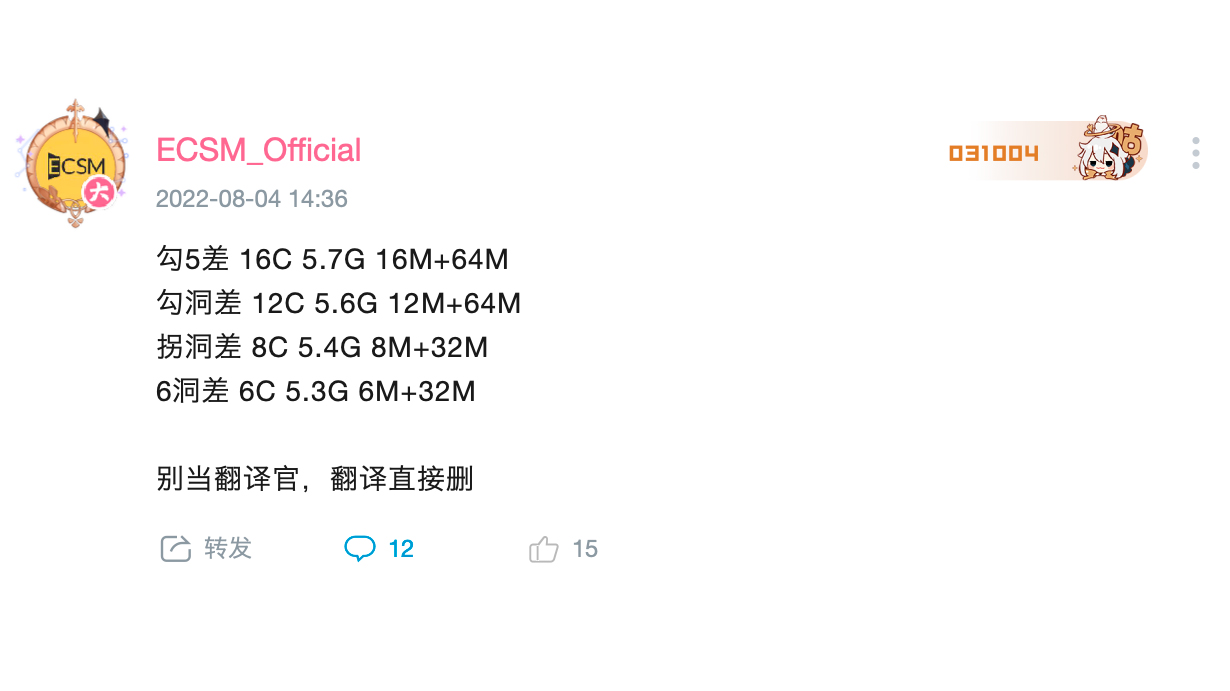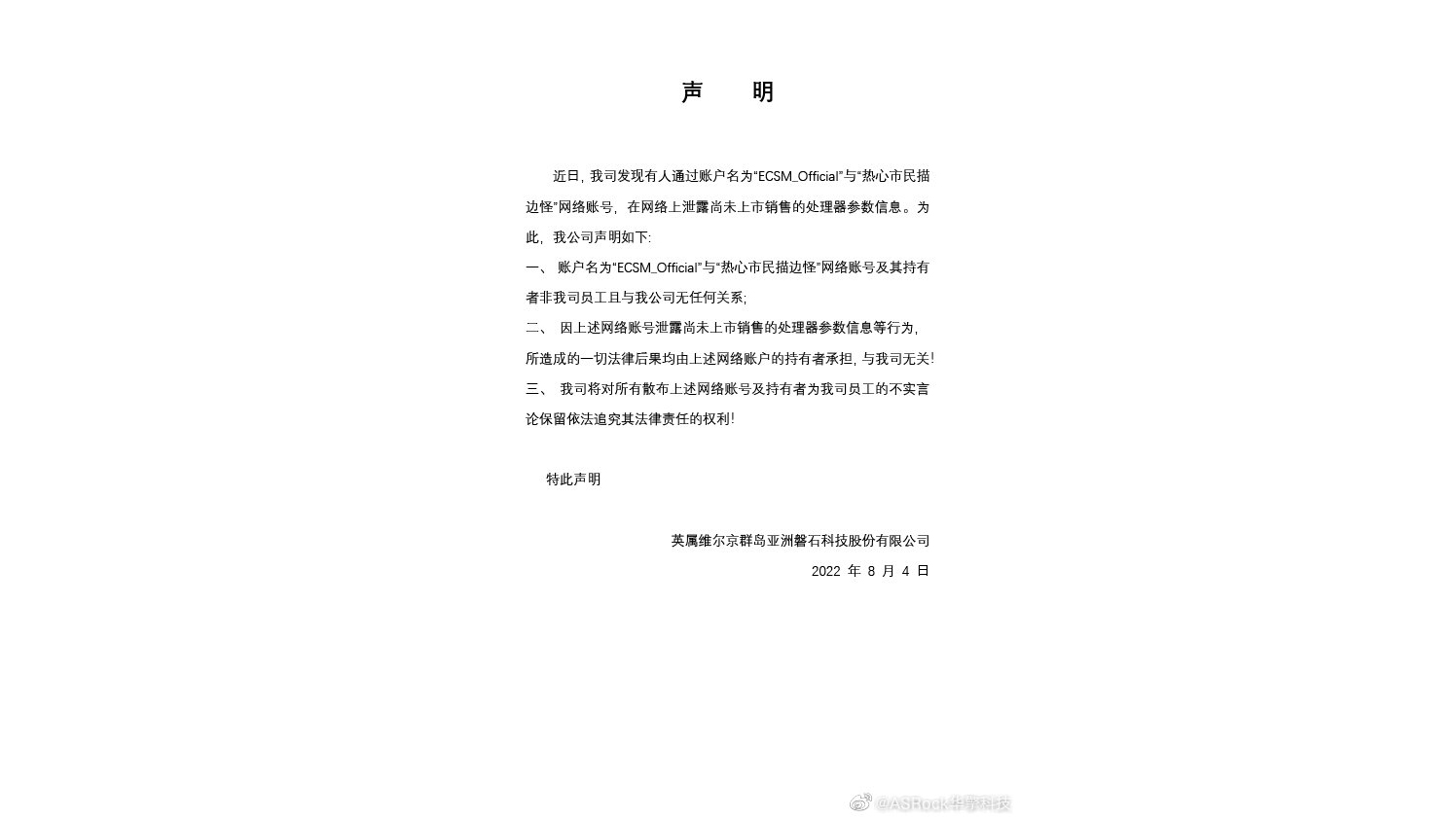AMD Zen 4 Specs Leak: 16-Core Ryzen 9 7950X Allegedly Hits 5.7 GHz
AMD's Ryzen 7000 (Raphael) processors with Zen 4 cores will arrive this fall to disrupt the best CPUs on the market. However, hardware leaker Enthusiastic Citizen has spoiled us with the potential specifications for the next-generation chips. Then, out of the blue, ASRock released an official statement via its Weibo account denying that the information came from the company, suggesting that the specifications are probably accurate.
Like Ryzen 5000 (Vermeer), Ryzen 7000 will max out at 16 cores and 32 threads. It may sound disappointing to some, as very early rumors claimed that AMD might go up to 24 cores on the consumer chips. But, objectively, AMD has little reason to raise the core count on its desktop Ryzen processors. The chipmaker already offers the highest number of cores on a consumer chip if you don't count Intel's whole hybrid antics with the Performance cores (P-Cores) and Efficiency cores (E-Cores). Raptor Lake, Ryzen 7000's competitor, flaunts up to 24 cores consisting of eight P-cores and 16 E-cores.
Nonetheless, there are many enhancements to look forward to with Ryzen 7000. For starters, the 5nm processors will rock AMD's latest and greatest Zen 4 cores, which the chipmaker has estimated to offer over 15% higher single-threaded performance and 35% higher multi-threaded performance than Zen 3. Ryzen 7000 also comes with boost clock speeds over 5.5 GHz and double the L2 cache. Unfortunately, the L3 cache remains untouched—all the improvements mentioned earlier come with a cost. In addition, Ryzen 7000 will push the TDP limit up to 170W (230W peak power), a 62% increase over Ryzen 5000.
As with all unreleased hardware leaks, we recommend treating the Ryzen 7000 specifications with caution. The fact that ASRock has issued a denial almost certainly tells us that the information is legit. If it were bogus, ASRock would have zero reasons to make a statement. It's weird because no one suspected ASRock was the leak's source. We suspect that Enthusiastic Citizen's informant may be working for ASRock.
AMD Ryzen 7000 Specifications*
| Processor | Cores / Threads | Boost Clock (GHz) | L2 Cache (MB) | L3 Cache (MB) |
|---|---|---|---|---|
| Ryzen 9 7950X | 16 / 32 | 5.7 | 16 | 64 |
| Ryzen 9 5950X | 16 / 32 | 4.9 | 8 | 64 |
| Ryzen 9 7900X | 12 / 24 | 5.6 | 12 | 64 |
| Ryzen 9 5900X | 12 / 24 | 4.8 | 6 | 64 |
| Ryzen 7 7700X | 8 / 16 | 5.4 | 8 | 32 |
| Ryzen 7 5700X | 8 / 16 | 4.6 | 4 | 32 |
| Ryzen 5 7600X | 6 / 12 | 5.3 | 6 | 32 |
| Ryzen 5 5600X | 6 / 12 | 4.6 | 3 | 32 |
*Specifications are unconfirmed.
The Ryzen 9 5950X will pass the reigns over to the Ryzen 9 7950X. The former has a 4.9 GHz boost clock, which was already pretty high. However, the Ryzen 9 7950X could peak at 5.7 GHz, blowing the former flagship out of the water by a 16% difference in boost clock speeds. Note that the boost clock is AMD's rated specification, and the chip would hit higher clock speeds depending on the workload. For example, the Ryzen 9 5950X had no problem boosting up to 5.1 GHz on some workloads.
The Ryzen 9 7900X and Ryzen 7 7700X will arrive to replace the Ryzen 9 5900X and Ryzen 7 5700X, respectively. As a result, we're looking at 17% higher boost clock speeds on the new Zen 4 chips. What we find strange is that there was no mention of the Ryzen 7 7800X in the leak, almost implying that the Ryzen 7 5800X may get a successor or the replacement may come in late. For Zen 3, AMD released the Ryzen 7 5800X first and consequently the Ryzen 7 5700X almost a year later. It was already too late when the Ryzen 7 5700X hit the retail market because Intel's comparable Alder Lake chips were faster and cheaper.
Get Tom's Hardware's best news and in-depth reviews, straight to your inbox.


The Ryzen 5 7600X will likely be the most attractive SKU for gamers. It's a very buffed-up version of the Ryzen 5 5600X, which was already a very capable gaming chip. Wielding the newer Zen 4 cores, the Ryzen 5 7600X could debut with a 15% higher boost clock.
AMD will unleash the Ryzen 7000 army this quarter. Therefore, we could expect an official announcement by the end of August or early September. The chipmaker's motherboard partners recently showed off their premium AM5 motherboards with X670 and X670E chipsets. MSI's AM5 marketing material firmly states September 15, so that's likely the date when Ryzen 7000 will arrive on the retail shelves. However, according to information from Enthusiastic Citizen, Raptor Lake may land on October 17, so Ryzen 7000 seemingly has the first-mover advantage.

Zhiye Liu is a news editor, memory reviewer, and SSD tester at Tom’s Hardware. Although he loves everything that’s hardware, he has a soft spot for CPUs, GPUs, and RAM.
-
hannibal Maybe they just did found out that 5800x is useless in the portfolio and instead just release directly 5800x3d aka 5700x with higher power budget and 3d cache. That actually makes sense, because 4700x is much better choice than normal 4800x, same with 3700x vs 3800x...Reply -
waltc3 The Zen4 CPU that will really ring the bell in gaming will be the 3D-vcache versions. I expect there'll be more than one with Zen 4 as AMD knows how popular they are. They're selling all the 5800X3Ds they can make, and it's been that way since launch.Reply -
JayNor " ...if you don't count Intel's whole hybrid antics..."Reply
Intel's e-cores are running at higher clock rates than the cores in my NUC box, and likely at much lower power than the zen4 cores. Are they real cores or not? -
BackBlast ReplyJayNor said:Intel's e-cores are running at higher clock rates than the cores in my NUC box, and likely at much lower power than the zen4 cores. Are they real cores or not?
They are real cores. And they are more power efficient than zen 3 (probably not zen 4) if you are running all of them. They don't scale down well because you can't run just one, you have to power an entire block of 4. Mostly they are area efficient, also read more efficient in compute per die area or dollar.
The problem with them is, we are putting so much compute power in every box that most computer use doesn't need the e-cores unless you're running a ridiculously parallel and long running task. Large compression/encoding/rendering tasks fit the bill but not much else does.
So, as I've heard it put, it's mostly a multi-core-benchmark-asic.
In my general use, I don't use more than ~4 cores, like ever. 6 cores gives me a very comfortable buffer. But I want those cores I do use to be fast. I don't run full out very often so the power at the top end doesn't matter so much. The 12500 or 12600 are the best chips out there for my use cases.
I expect the 7600X and 13500/13600 to fill a similar segment this time around. -
spongiemaster Reply
Is this outside the US? Here in the US, it's the 2nd worst selling 5000 series CPU sold at both Newegg and Amazon. #12 at Newegg, only ahead of the R5 5500 at #13. #15 at Amazon, only ahead of the R5 5600 at #16. It's in stock at both stores, so it isn't that low because it is sold out and there are none to sell.waltc3 said:The Zen4 CPU that will really ring the bell in gaming will be the 3D-vcache versions. I expect there'll be more than one with Zen 4 as AMD knows how popular they are. They're selling all the 5800X3Ds they can make, and it's been that way since launch.